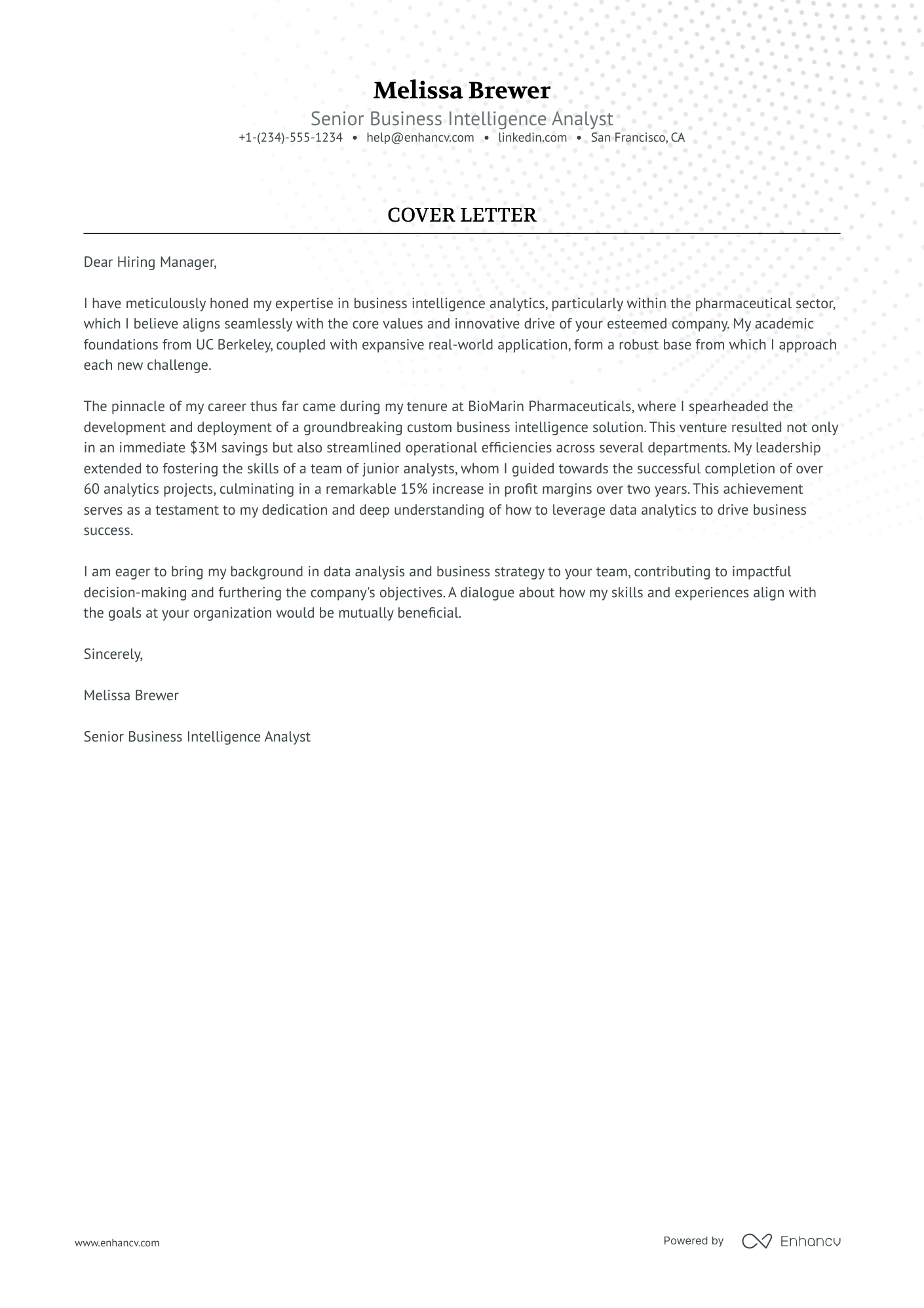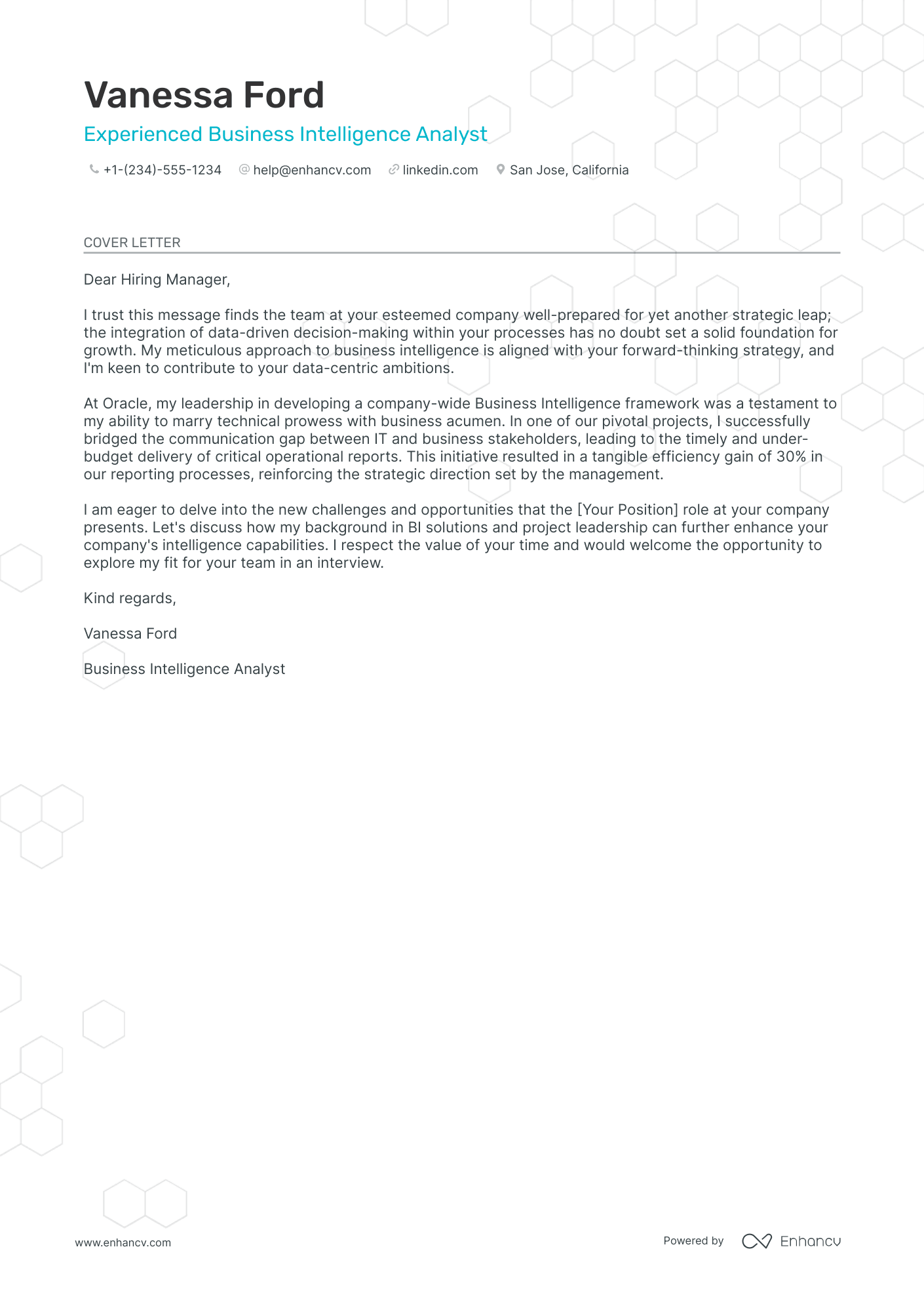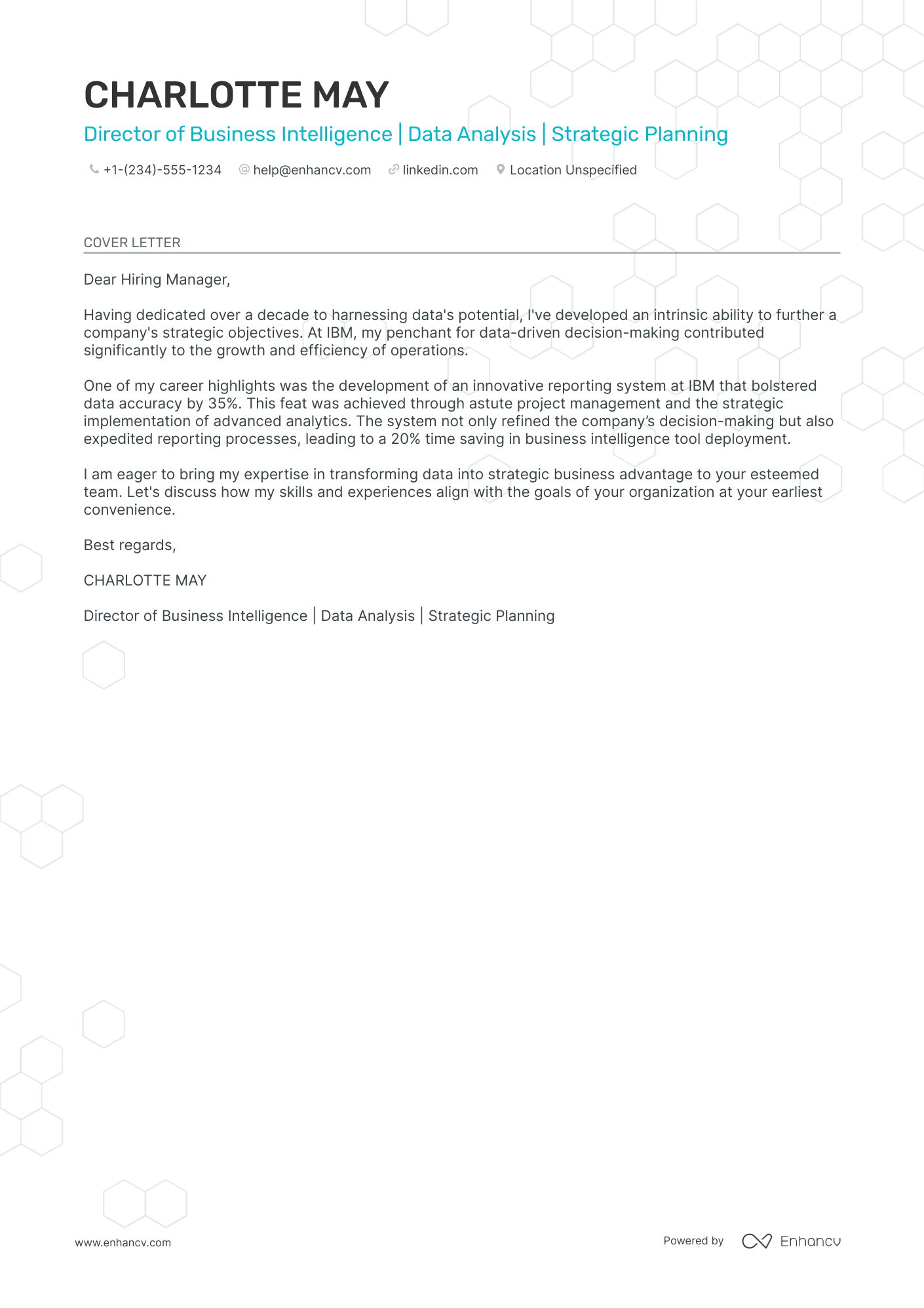Embarking on your job hunt, you've likely realized that a strong business intelligence cover letter can set you apart, but crafting one can be daunting. It's not just a repeat of your resume. Instead, zero in on a standout professional triumph and weave a compelling narrative. Steer clear of worn-out phrases to keep it original and engaging. Remember, brevity is key; pack a punch in just one page to make a memorable impression.
- Personalize the greeting to address the recruiter and your introduction that fits the role;
- Follow good examples for individual roles and industries from job-winning cover letters;
- Decide on your most noteworthy achievement to stand out;
- Format, download, and submit your business intelligence cover letter, following the best HR practices.
Use the power of Enhancv's AI: drag and drop your business intelligence resume, which will swiftly be converted into your job-winning cover letter.
If the business intelligence isn't exactly the one you're looking for we have a plethora of cover letter examples for jobs like this one:
- Business Intelligence resume guide and example
- Resource Manager cover letter example
- Alliance Manager cover letter example
- Business Systems Analyst cover letter example
- Servicenow Business Analyst cover letter example
- Business Development Executive cover letter example
- Branch Operations Manager cover letter example
- Warehouse Operations Manager cover letter example
- Revenue Cycle Manager cover letter example
- Healthcare Business Analyst cover letter example
- Configuration Manager cover letter example
Drop your resume here or choose a file.
PDF & DOCX only. Max 2MB file size.
Business intelligence cover letter example
CARLA JENSEN
Miami, FL
+1-(234)-555-1234
help@enhancv.com
- Quantifying achievements: The cover letter includes specific statistics such as an annual cost-saving of over $500K and doubling lead generation, showcasing the candidate's ability to deliver measurable results which are very persuasive in business intelligence roles.
- Relevant Experience: Mentioning a successful project with a well-known client like Allianz SE demonstrates the candidate's capacity to manage large-scale data projects and provides credibility to their application.
- Strategic Impact: The letter emphasizes the strategic impact of the candidate's work by linking their technical skills to business outcomes, an essential aspect for a Business Intelligence Developer role, where translating data into business strategies is key.
Designing your business intelligence cover letter: what is the best format
Let's start with the basics, your business intelligence cover letter should include your:
- Header
- Greeting
- Introduction
- Body paragraph
- Closing statement
- Signature (that's not a must)
Next, we'll move to the spacing of your business intelligence cover letter, and yes, it should be single-spaced (automatically formatted for you in our cover letter templates).
Don't go for a old-school font (e.g. Arial or Times New Roman), but instead, pick an ATS-favorite like Chivo, Volkhov, or Raleway, to stand out.
Our cover letter builder is also set up for you with the standard one-inch margin, all around the text.
Finally, ensure your business intelligence resume and cover letter are in the same font and are submitted in PDF (to keep the formatting in place).
P.S. The Applicant Tracker System (or ATS) won't be assessing your [job] cover letter, it's solely for the recruiters' eyes.
Why spend hours writing a cover letter? Our free cover letter generator can do it for you in seconds.
The top sections on a business intelligence cover letter
Header with Contact Information: Include your name, address, phone number, and email so the recruiter can easily reach out to you; for a Business Intelligence role, consider adding your LinkedIn profile or a link to your online portfolio to show your grasp of online professional platforms.
Salutation: Address the cover letter to a specific person if possible; using a name rather than a general greeting emphasizes your attention to detail, a critical attribute for a Business Intelligence professional.
Introduction: Briefly mention how your experience aligns with the job role, perhaps highlighting a key win with data analytics or a successful project; this grabs the recruiter’s attention and showcases your relevance from the outset.
Body (with Evidence of Skills and Experience): Provide concrete examples of how your skills in data analysis, reporting, and business acumen have benefited previous employers or projects, as recruiters look for proven ability in making data-driven decisions.
Closing and Call to Action: End by summarizing your enthusiasm for contributing to the company's success through data insights and analytics, and express your desire to discuss how you can specifically help their team in an interview; a strong finish demonstrates your proactive attitude, critical for a Business Intelligence role.
Key qualities recruiters search for in a candidate’s cover letter
- Proficiency in BI tools (e.g., Tableau, Power BI, Qlik): Demonstrates the ability to analyze data and create reports and dashboards.
- Data analysis expertise: Shows you can draw meaningful insights from various data sets to inform business decisions.
- Experience with SQL and database management: Indicates a strong foundation in handling and querying databases to retrieve the data necessary for analysis.
- Understanding of data warehousing concepts: This reflects knowledge of how data is organized, stored, and retrieved in a way that is useful for business analysis.
- Strong business acumen: Conveys an understanding of key business performance indicators and the ability to align BI initiatives with strategic goals.
- Excellent communication and storytelling skills: Essential for translating complex data findings into clear, actionable business insights for stakeholders.
How to start your business intelligence cover letter: with a greeting, of course
Have you ever considered just how powerful a personalized salutation can be?
We sure have news for you! Your business intelligence cover letter should start with the right salutation to recruiters, nurturing a sense of respect and individuality.
Greet recruiters by using their first name (e.g. "Dear Tom" or "Dear Patricia") if you've previously established contact with them.
Otherwise, opt out for the less familiar, "Dear Ms. Peaches" or "Dear Ms Kelsey", if you've found the recruiter's name on LinkedIn or a corporate website.
"To whom it may concern" is never a good option, as it creates a sense that you've been sending out your business intelligence cover letter to anyone. Instead, use "Dear HR team" or "Dear (company name) recruiter" for a feeling of exclusivity.
List of salutations you can use
- Dear Hiring Manager,
- Dear [Company Name] Team,
- Dear [Hiring Manager's Full Name],
- Dear [Department Name] Leader,
- Dear Mr./Ms. [Last Name],
- Dear [Job Title] Hiring Committee,
First introductions in your business intelligence cover letter
Within your business intelligence cover letter introduction, genuinely state what you like about the organization.
Research the latest company projects, honorary awards, company updates, etc.
Write up to two sentences to let recruiters know what impresses you about the company,
This would help you to set a good tone for the rest of the communication.
How to write an achievement-focused business intelligence cover letter body
We've got the intro and greeting covered. Now, comes the most definitive part of your business intelligence cover letter - the body.
In the next three to six paragraphs, you'd have to answer why should recruiters hire you.
What better way to do this than by storytelling?
And, no, you don't need a "Once upon a time" or "I started from the bottom and made it to the top" career-climbing format to tell a compelling narrative.
Instead, select up to three most relevant skills for the job and look back on your resume.
Find an achievement, that you're proud of, which has taught you these three job-crucial skills.
Quantify your accomplishment, using metrics, and be succinct in the way you describe it.
The ultimate aim would be to show recruiters how this particular success has built up your experience to become an invaluable candidate.
Thinking about the closing paragraph of your business intelligence cover letter
Before your signature, you have extra space to close off your business intelligence cover letter.
Use it to either make a promise or look to the future.
Remind recruiters how invaluable of a candidate you are by showing what you plan to achieve in the role.
Also, note your availability for a potential next meeting (in person or over the telephone).
By showing recruiters that you're thinking about the future, you'd come off as both interested in the opportunity and responsible.
Business intelligence cover letter advice for candidates with no experience
If you're worried about writing your Business Intelligence cover letter and have no professional experience, we sure have some advice for you.
Turn recruiters' attention to your transferable or relevant skills gained thanks to your life and work experience.
Instead of writing about past jobs, focus on one achievement (whether from your volunteering experience, education, etc.) and the skills it has helped you build.
Alternatively, you could focus your Business Intelligence cover letter on your career objectives and goals. Always remember to make those relevant to the job you're applying for by detailing how you see yourself growing as part of the company.
Recruiters would be way more impressed with candidates who fit the job profile and can bring about plenty of skills and vision to the table.
Key takeaways
Within this Enhancv guide, we've provided you with plenty of advice and inspiration on writing your business intelligence cover letter:
- Always make sure your business intelligence cover letter is tailored to the role you're applying for to make a good impression on recruiters;
- In your business intelligence cover letter include a header (with your name, the role you're applying for, date, and contact details) and an introduction of up to two sentences that highlight your key accomplishment or why you'd fit the role;
- Focus your business intelligence cover letter body on one sole achievement through your career and all the valuable lessons, skills, and know-how you've learned (that are relevant to the role);
- Ensure your business intelligence cover letter closing statement isn't generic and includes either a call to action or a promise;
- If you lack professional experience, shift recruiters' focus to a relevant achievement (thanks to your academic or versatile experience) or toward your dreams and goals for professional growth.
Business Intelligence cover letter examples
By Experience
Senior Business Intelligence Analyst
By Role








